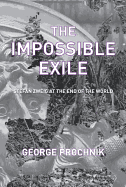
George Prochnik (In Pursuit of Silence) acknowledges that it took him a long time to grasp how much was lost over the course of his family's harrowing flight from Hitler's Vienna. "If only a third of European Jewry survived Hitler, only a tiny fraction of those who did escape made it out with their former identities and sense of their humanity intact," he observes. This sense of immeasurable loss could be due in part to the survivors' silence following their catastrophe. Thus, for Prochnik, the flight of once-famous Austrian writer Stefan Zweig provides a valuable perspective on the insidious costs of exile.
Prochnik's book poignantly depicts Zweig's spiritual impotence. Despite--or because of--his fame, Zweig embodied the archetypal refugee in his inability to cope with what Milan Kundera calls "the unbearable lightness of being"--the sense of utter irrelevance when one is ejected from one's social milieu. Refusing to denounce Hitler publicly, Zweig retreated into his work, which he thought would serve as an effective indictment against the dictator's barbarism. But he didn't escape a horrible regime to reach safety. Rather, Zweig's eight-year odyssey from Austria to England, then to the U.S. and, finally, Brazil--where he committed suicide--showed an inexorable regression from "civilization" toward untamed nature.
Yet exile, like far-flung seeds, can offer redemption years into the future. Entwining the concepts of gardening and Bildung ("education" or "formation"), Prochnik shows that Zweig's exile and death were not futile; Zweig's memoir The World of Yesterday explicitly addresses Vienna's guilt and helps steer his postwar readers from their dark past. --Thuy Dinh, editor, Da Mau magazine

